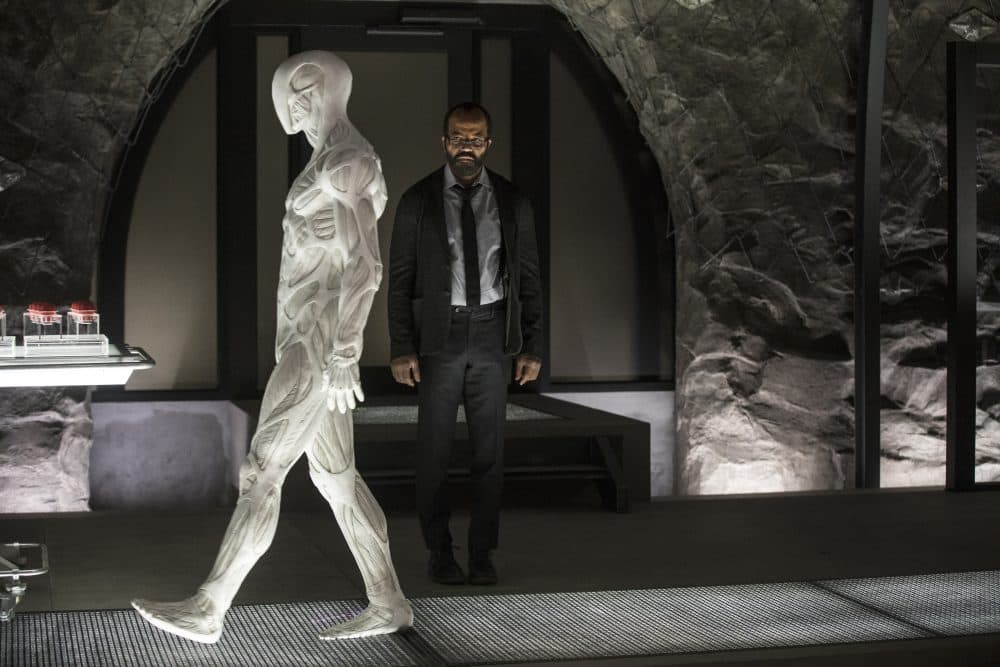Advertisement
The Popularity Of 'Westworld' Points To Our Anxiety About AI, The Show's Creators Say
Resume
Warning: Spoilers ahead!
HBO's "Westworld" is now in its second season. The show takes place some time in the future at a theme park that looks straight out of an old Western. The park is filled with humanoid robots, or "hosts," who exist for the humans, or "guests," to enact their fantasies.
When they're killed, the hosts' memories are wiped and they're returned to the park. But in season one, hosts begin to remember their past lives, which leads to the assassination of the park's creator and an uprising of the robots.
That's where season two picks up. Here & Now's Jeremy Hobson discusses with the show's co-creators, Jonathan Nolan and Lisa Joy.
Interview Highlights
On whether they think artificial intelligence will develop the way it does in "Westworld"
Jonathan Nolan: "No, not at all. 'Westworld' is a flight of fancy, and a parable, more than anything else. The way that this seems to be playing out is with conversational AI on one level — so you have your Siri or your Alexa — and then you're looking at networked intelligence, you're looking at a narrow AI that's sifting through the data, and you're looking at the kind of algorithmic intelligence that is so prominent in the news in the last couple of months with regards to social media.
"If things play out with AI the way that they have done with Facebook, we're in a lot of trouble."
Jonathan Nolan
"We've looked at social media as kind of a dress rehearsal for AI, a dress rehearsal in the sense that we're looking at artificial intelligence and asking the question, 'Will we build it responsibly?' There's no government agency tasked with monitoring it or regulating it. And if social media is a dress rehearsal, then we've just failed badly. If things play out with AI the way that they have done with Facebook, we're in a lot of trouble."
On a storyline involving the park taking data from humans who visit, and if it relates to news involving Facebook and other tech companies' use of data
Lisa Joy: "Yes, it's been something that we've been thinking about for a long time. And I think the greatest danger that AI poses isn't so much these anthropomorphic beings who look like us and are beguiling are going to fool us. It's the fact that a intelligence without a body or corporeal form will fool us into trusting it with data, which we seem to think is ... it has no repercussions. But the fact is, a noncorporeal intelligence can do even more damage than one that is limited to a physical form."
JN: "We'd be lucky if the problem was the problem that we're facing in 'Westworld.' If we're dealing with Evan Rachel Wood or Thandie Newton, we'd welcome those robot overlords. The ones we've gotten instead are your Facebook feed. And I think that's far more problematic."
On what the hosts are learning from the guests
LJ: "The hosts have seen both the best and the worst of human nature, and in the first season, we really focused on some of the negative behaviors on the guests. And so if we are like parents to the hosts, they certainly have learned some bad lessons. But I think that it's also a general cautionary tale about hubris. The ways in which mankind tends to invent technology is because we have this drive to create and to innovate, and we don't necessarily pump the brakes when we're doing it. We think, 'Well, if we created it, we'll always be able to control it.' And I'm not sure that that is something that we should rely on."
"The most exciting opportunities are often the terra incognita in terms of character, and for that, it's the women — a lot of these [Westerns], they really didn't dig that deep into the female characters."
Lisa Joy
On whether the #MeToo movement influenced the storylines of the show's female characters in season two
LJ: "It happened much more organically than that. By the time the #MeToo movement started, we had already finished writing all our scripts and were in the middle of production. That being said, the #MeToo movement is a movement that feeds off of what has been happening in society, and neither Jona nor I are blind to that, nor are we immune to that.
"And so when embarking upon this journey in terms of, 'OK, we have the chance to do a Western sci-fi. Creatively, what are the most exciting opportunities there?' And the most exciting opportunities are often the terra incognita in terms of character, and for that, it's the women — a lot of these movies, they really didn't dig that deep into the female characters. And so creatively speaking, you always want to try to say something new and explore people that you haven't seen before.
"Emotionally speaking, we're in a moment where, much like the characters in Westerns, women could be overlooked or typecast or made really binary in a way. They were kind of subject to the male gaze and thought of as either sinners or saints, virgins or whores, or weak or castrating, and now was our chance to really get inside that kind of thinking, and to examine it through the female host's perspective."
On how being married impacts their work on the show
LJ: "Well, we had two kids while we were making this show."
JN: "One per season."
LJ: "One per season, yes. So we have work babies and we have the human babies, and when we're talking too much about work, the human babies complain loudly, and they're what I think keeps us sane and grounded, while also somehow making our schedule more insane and less grounded."
This article was originally published on May 14, 2018.
This segment aired on May 14, 2018.